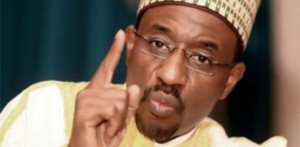Sanusi laments $79pb oil price benchmark may cause inflation
 The Governor of Central Bank of Nigeria (CBN), Sanusi Lamido Sanusi has warned that the economy will be at risk of inflation if the FG upholds the $79 per barrel, oil price benchmark infused in the 2013 budget.
The Governor of Central Bank of Nigeria (CBN), Sanusi Lamido Sanusi has warned that the economy will be at risk of inflation if the FG upholds the $79 per barrel, oil price benchmark infused in the 2013 budget.
Sanusi disclosed this yesterday in Abuja during the meeting of the Monetary Policy Committee (MPC), saying that the increase from $75 to $79 per barrel will most likely “constitute a pressure point for low inflation objective and effective monetary policy as a whole in 2013.’’
The CBN Governor however promised that the committee will do everything within its powers to respond properly if inflation threatens dues to public spending.
Sanusi said that he was aware that the challenges faced by Small and Medium Enterprises (SMEs) are not just because of interest rates.
Speaking after the Monetary Policy Committee (MPC), he said it would be wrong if the CBN is blamed for the problems confronting SMEs because of high interest rates.
His words, “People should also not underestimate the impact of instability on the SMEs. High interest rates are not the only reason SMEs cannot access cheap credit,” Adding, he said he cannot “tell when rates would come down, but would also like to see rates come down, just as the Federal Government wants rates to come down.”
Even so, Sanusi said the rate will stay as it is, as in previous months.
He said: “The Committee decided to maintain rates as it stands with MPR at 12 per cent with a corridor of +/- 200 basis points,” adding that the committee also agreed to “maintain the Cash Reserve Ratio (CRR) at 12 per cent, and liquidity ratio at 13 per cent.”
He affirmed that the CBN had sustained the MPR at 12 per cent for this long, for the reason that the economy “cannot have low interest rate in high inflation rate regime,” saying that the “CBN‘s ability to bring down rates is a function of its ability to maintain stability.”
The Monetary Policy Committee (MPC) has in addition warned against smugness relating to government’s revenue. Sanusi noted, “Despite the high level of oil prices, the committee noted that government has been able to keep deficit within the threshold of the dictates of the Fiscal Responsibility Act.
Speaking on the country’s foreign reserves he said, he was happy to disclose that the reserves have increased to $44.3 billion by 16 January, a $10 billion increase.
Meanwhile, the naira moved stronger by less than 0.1 per cent to N157.10 a dollar.








